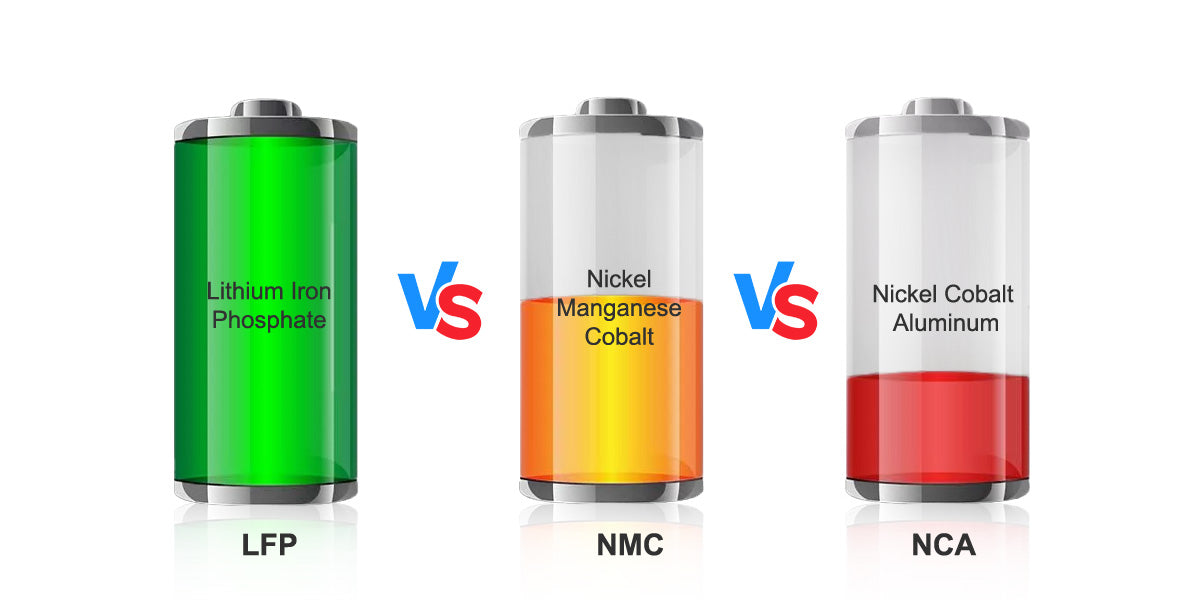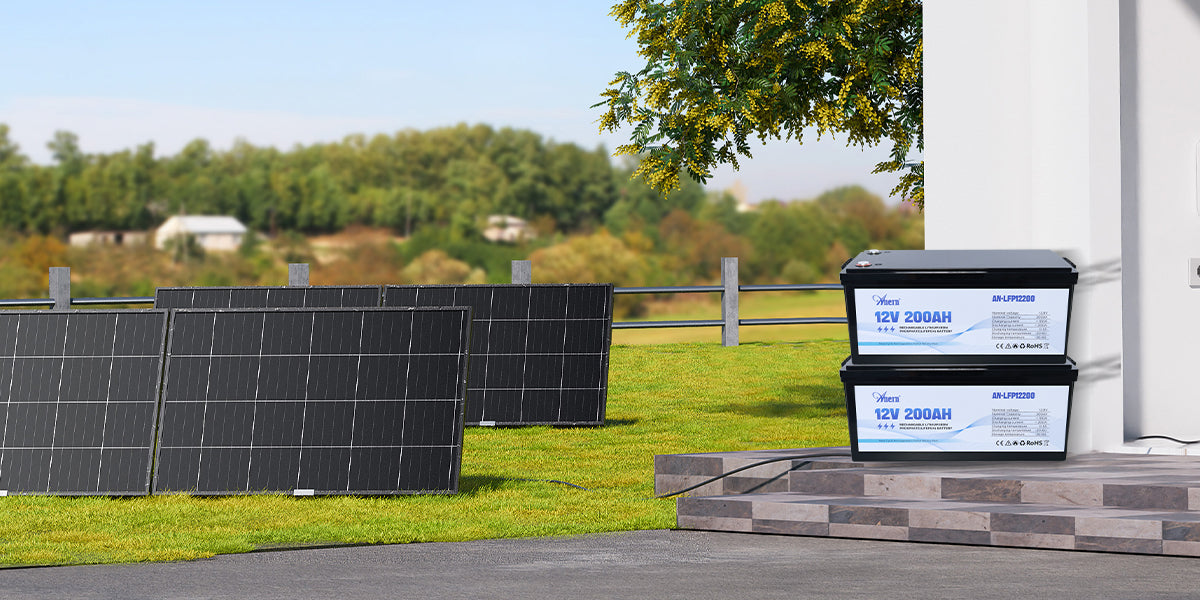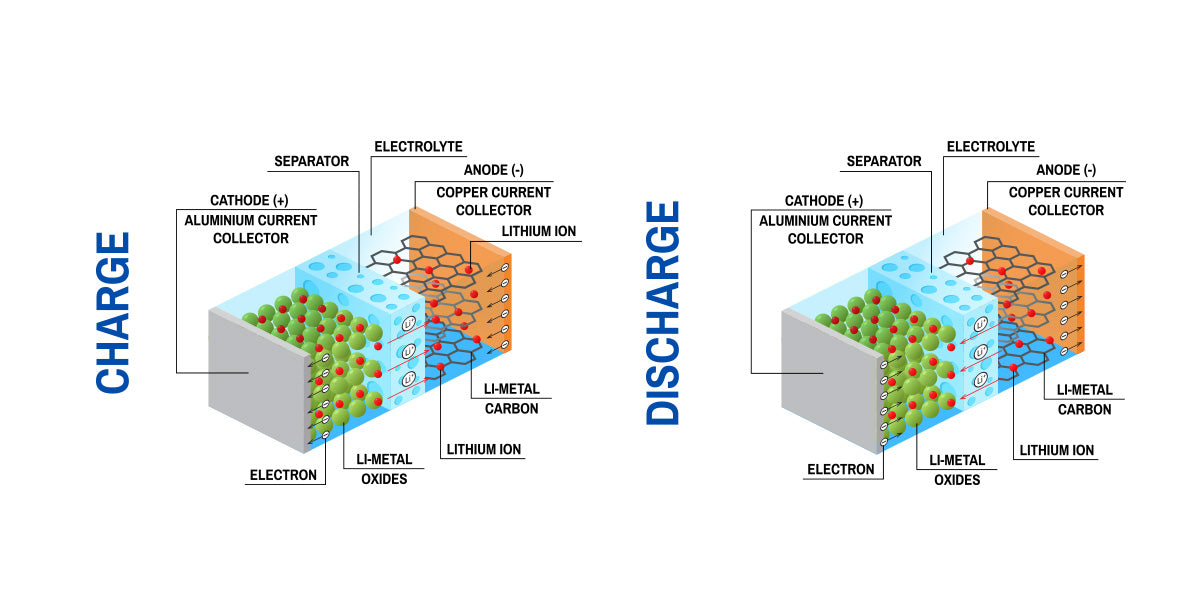Choosing lithium battery for solar is an important decision as it directly affects the performance, efficiency, and economy of your solar power installation.
Among the most common battery chemistries for solar, LiFePO4 vs NMC for solar and LiFePO4 vs NCA for solar applications are some of the most applicable comparisons. All of these batteries have their own set of attributes that make them extremely well-suited for specific applications, and not so well-suited for others.
In this article, we will introduce you to the differences between LiFePO4 and NMC batteries, on the basis of energy density, cycle life, safety, cost-effectiveness, and environmental sustainability, so you can choose the best option for your solar installation.
Here’s the comparison table for LiFePO4, NMC, and NCA batteries:
| Feature | LiFePO4 | NMC | NCA |
| Battery Chemistry | Lithium Iron Phosphate | Nickel Manganese Cobalt | Nickel Cobalt Aluminum |
| Energy Density | Lower energy density | Higher energy density | Higher energy density |
| Cycle Life | 3,000 to 5,000 cycles | 1,000 to 2,500 cycles | 1,000 to 2,500 cycles |
| Safety | Very safe, little chance of thermal runaway | Greater risk of overheating and fire | Greater risk of overheating and fire |
| Cost | Lower cost | Higher cost | Higher cost |
| Lifespan | Long lifespan, suitable for long-term use | Shorter lifespan, requires more replacements | Shorter lifespan, requires more replacements |
| Environmental Impact | Environmentally friendly (utilizes abundant materials) | Environmental issues from cobalt | Environmental issues from cobalt |
| Ideal Use | Residential solar, long-term storage | High-performance, space-constrained applications | High-performance, space-constrained applications |
| Heat Resistance | Good heat tolerance | Moderate heat tolerance | Excellent heat tolerance |
| Efficiency | Reliable but less energy-dense | Highly efficient for high power requirements | Highly efficient for high power requirements |
Why Is It Important to Choose the Right Lithium Battery for Solar?
In choosing a lithium battery for solar, you should understand how it will impact your system performance and long-term cost. A good battery ensures you have power available whenever you need it, whether you're off-grid or just need to save energy during peak periods of use. Different batteries offer different benefits, such as LiFePO4 battery benefits for solar, such as safety, life span, and lower upfront cost.
For example, LiFePO4 vs NMC for solar illustrates that LiFePO4 is the most suitable option for a person concerned with safety and long-term reliability, and NMC offers higher energy density at a higher cost with some safety concerns. The selection of the right battery, then, depends on what you need—whether long-term reliability, high energy, or less up-front expenditure. Understanding the differences between LiFePO4 and NMC will allow you to choose the best-fit battery for your energy needs.

What are NCA, NMC, and LiFePO4 Batteries?
LiFePO4 Chemistry
LiFePO4 (Lithium Iron Phosphate) is a popular solar energy storage solution because it is durable and safe. It uses iron phosphate as the cathode material and lithium as the anode. While LiFePO4 is less energy-dense than NMC and NCA, it makes up for it with long-term performance and increased safety. LiFePO4 battery advantages for solar include that it is reliable and long-lasting, making it a great fit for home solar systems.
NMC Chemistry
NMC stands for Nickel Manganese Cobalt, and it uses a combination of these metals for the battery's cathode. This makes NMC batteries energetic and dense, and therefore, they're normally used in high-performance applications, for example, electric vehicles (EVs). When comparing NMC battery vs LiFePO4 battery for solar energy, NMC batteries possess higher energy storage, but they're costlier and have safety concerns, especially in harsh environments.
NCA Chemistry
NCA (Nickel Cobalt Aluminum) batteries are similar to NMC, but with the addition of aluminum for improved thermal stability. They are often used in high-performance applications, such as in Tesla vehicles, due to their high energy density and efficient energy storage. However, like NMC, they are also costlier and, additionally, present safety risks due to the cobalt. When comparing LiFePO4 vs NCA for solar applications, NCA batteries are better in terms of heat resistance but are more expensive and less safe than LiFePO4.
How Does Energy Density Affect Power Storage Capacity and Battery Size?
Energy density is one of the key factors to consider when choosing a solar battery. It is a measure of how much energy a battery can store relative to its size. With higher energy density, you can get more energy stored in a smaller, lighter battery.
LiFePO4 Energy Density
LiFePO4 batteries are less energy-dense than NMC and NCA, meaning they are heavier and larger for the same energy storage. However, LiFePO4 batteries make up for it with improved safety and a longer life. They're a great match for home and small-scale commercial solar battery installations, especially where space isn't much of a concern. LiFePO4 vs NMC for solar shows that lower energy density is a trade-off for improved durability and safety.
NMC and NCA Energy Density
NMC and NCA batteries are much more energy-dense than LiFePO4, meaning they can store more energy in a lighter, smaller battery. That makes them a good fit for large solar storage systems or for applications where space is at a premium, such as electric vehicles. LiFePO4 vs NCA for solar applications shows that NCA has a very slightly higher energy density than NMC, meaning it stores more energy per unit of weight. It does so at a higher cost and with some additional safety concerns.
How Do Solar Batteries' Cycle Life and Lifespan Affect Their Operation?
A battery's cycle life is the number of times you can charge and discharge it before it loses significant power. The more cycle life, the longer the battery will survive, and the more you'll save in the long term.
LiFePO4 Cycle Life and Durability
LiFePO4 batteries last very long, with 3,000 to 6,000 charging cycles. This is one of the longest lifetimes for solar batteries. LiFePO4 battery advantages for solar include that it is long-lasting and has little or no maintenance, making it an excellent choice for homeowners who want a long-term solution that is dependable. These batteries are ideal for people who want a low-maintenance battery that will last for years.
NMC and NCA Cycle Life and Durability
NMC and NCA batteries last for 1,000 to 2,500 cycles, which is less than LiFePO4. While they provide high energy output and performance when new, they may need to be replaced more frequently, which can lead to higher costs over time. They are typically used in commercial installations or large solar systems where energy density and compact size take higher priority than lifespan.
How Do NCA, NMC, and LiFePO4 Compare in Terms of Safety?
Safety is a major factor in the selection of a battery, especially for solar systems. Lithium-ion batteries are prone to thermal runaway, or the heating of the battery or ignition by fire as a result of a failure. Each battery chemistry has a safety profile based on the material and how the battery is managed.
LiFePO4 Safety
LiFePO4 batteries are the safest among all lithium batteries. They are very stable and do not ignite easily. The iron phosphate content in the cathode material provides them with higher resistance to heat and overcharging than other batteries. If safety is your top priority, LiFePO4 battery advantages for solar include low thermal runaway risk and high reliability overall.
NMC and NCA Safety
While NMC and NCA batteries have high energy density, they are riskier in terms of safety. They easily overheat and become unstable, especially when exposed to high temperatures or mishandled. Additionally, the cobalt used in the batteries is toxic and harmful to the environment. Despite these risks, NMC battery vs LiFePO4 battery for solar energy will be safe where there are effective management systems and protection measures.
FAQs About Choosing Your Solar Battery
Q1. What's the Best Kind of Battery for Residential Solar Installations?
FePO4is the best choice for home solar installations as it is safe, long-lasting, and low-cost. While MC and CA are more energy-dense, the increased price and safety concerns make them less suitable for most homeowners.
Q2. How Do I Know If LiFePO4 Is the Best Choice for My Solar Needs?
If you prioritize safety, longevity, and economy in the long run, iFePO4 is a great choice. It's a good fit for home solar systems where you have room and are seeking a low-maintenance, reliable solution.
Q3. Can I Use NCA or NMC Batteries for Off-Grid Solar Systems?
Yes, CA and MC batteries can be used in off-grid solar systems, especially when more energy density is needed in a compact space. But they have higher upfront costs and more maintenance than iFePO4.
Q4. What's the Role of Energy Density in Solar Batteries?
Energy density is a measure of how much energy a battery can store relative to its size. More energy density means more energy in a smaller, lighter battery, which is important when space is limited in solar installations.
Q5. Are NMC and NCA Batteries Worse for the Environment Than LiFePO4?
Yes, MC and CA batteries are worse for the environment because they use cobalt and nickel, which are mined and present environmental challenges. LiFePO4 is more environmentally friendly because it uses more abundant and less toxic materials.
The Final Verdict: Which Battery Is Right for Your Home?
Choosing the best lithium battery for your solar system depends on what's most important to you: safety, energy density, lifespan, and cost. LiFePO4is the best compromise of safety, cost, and longevity and is therefore the ideal choice for most home solar installations. MC and CA batteries are higher energy density but costlier and with higher safety concerns. For most solar users, LiFePO4 vs NMC for solar and LiFePO4 vs NCA for solar demonstrate that LiFePO4 provides the most well-rounded, affordable, and safe energy storage solution.





Leave a comment
All comments are moderated before being published.
This site is protected by hCaptcha and the hCaptcha Privacy Policy and Terms of Service apply.